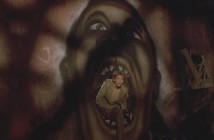
Another unimpressive round on the Netflix beat this week, with a pair of Oscar-nominee docs all that’s there to lift the weight of a host of bad-to-boring genre fare. February’s been a funny old month for us streamers; with March’s first-of-the-month madness right around the corner, the patience it’s taken won’t be long paying off.

Bad Milo! (Read our full review)
Any movie in which the protagonist’s problems are solved via the murderous rage of an anthropomorphic polyp who emerges unannounced from his ass, surely, can do no wrong. And yet Bad Milo!, its demented description aside, is a terribly turgid affair, never quite steering the myriad possibilities of this spectacularly silly story to anything beyond basic bog-humour. Director Jacob Vaughan counts the likes of Jeff, Who Lives at Home and The Happy Poet among his assistant editorial credits; there’s a sense of those films’ layabout likeability here—not to mention executive producer credits for the brothers Duplass—but it’s mostly misused in Vaughan’s any-joke-will-do approach. It’s all the more a shame for the cult comedy this could easily be: the bug-eyed bizarreness of the creature design, like a kinda-cute intestinal E.T., makes for many scenes of delectably deranged murder; the half-baked humour makes the space between so trying. SO-SO.

Best Man Down (Read our full review)
Never underestimate the power of a great performance. Were Best Man Down without the emotive immediacy of Addison Timlin, its relegation to the scrap heap of typical American indies wouldn’t warrant a second thought. But she, playing the one person who might truly have known the groomsman whose death the title teases, elevates the enterprise far above the level it otherwise earns. Not that it’s particularly bad elsewhere: Ted Koland’s comedy thrives on a gently caustic sensibility, its laughs less the centre than the feeble front that masks it. Justin Long and Jess Weixler do well as the newlyweds who cancel their honeymoon to attempt to find the truth of their fallen friend’s life; cloaked as it is in the trappings of dozens of narratives like it, Best Man Down taps an emotion with surprising staying power. It’s almost easier to dismiss it than to admit to the effect of its unlikely charm. WORTH WATCHING.

Casino Jack and the United States of Money
There’s an exhausting amount of information to be absorbed in Alex Gibney’s 2010 portrait of so-called “super-lobbyist” Jack Abrahamoff whose stranglehold on DC politics the documentarian uses to point to the problems inherent in capitalist society. It isn’t just the way it dutifully stacks the deck that we might think to compare Casino Jack and the United States of Money to House of Cards, nor indeed the fact that Kevin Spacey starred in this story’s same-year fictionalisation; both productions take an overwhelmingly cynical approach to the machinations of the Capitol, showing the debauchery of democracy in the unbelievable antics of their central characters. That Gibney’s is true should make it all the more compelling, yet the director’s mad dash to tell us more and more make for a movie that’s only a mite lighter than a lecture. “Make an action movie instead!” Abrahamoff exclaims over email in the opening screen; Gibney seems, not without success, to have tried. WORTH WATCHING.

Enron: The Smartest Guys in the Room
If Casino Jack plays like the documentary answer to House of Cards, Enron: The Smartest Guys in the Room might best be called Gibney’s Wolf of Wall Street. It’s not just for the eponymous company’s cameo amidst the audacious antics of the later film that this 2005 portrait of their soaring shares and the tactics behind them paints it something of a companion piece; with considerably more success, Gibney here fluffs the facts with a frantic info-taining approach. Part character study of the kind of men and masculinity capitalism breeds and feeds, part taut thriller that thrives on making us complicit, Enron’s everything Casino Jack almost managed to be, and an Oscar-nominee to boot. The cautionary note on which it’s forged, of course, seems bitterly moot now; the decade’s been kind to Gibney’s film, if at the expense of the viewers who’ll now find all the more intrigue in its picture of the perils of monetary misdeeds. RECOMMENDED.

Jesus Camp
Painted by plenty as quasi-horrific in tone, Jesus Camp’s avowed objectivity in presenting the goings-on in the evangelical Christian community and the indoctrination of children into the faith might say more of the viewer than the film. Yet it’s clear to see that it’s anything but; easy as it is to imagine the documentary’s subjects nodding firmly at all they see onscreen, the insertion of audio preaching against this perceived extremism skews steadily toward editorialising. It’s easy to see the movie, then, as an attack on an easy target, the lacking wider context of which renders it a portrait no more non-partisan than Religulous. But of course that doesn’t make it a bad one: it’s as easy to appreciate directors Heidi Ewing and Rachel Grady’s Oscar nomination as it is difficult to watch the intimate scenes of speaking in tongues that earned them it; if Jesus Camp isn’t the fair portrait it claims itself, that’s hardly the filmmakers’ fault. RECOMMENDED.

Random Acts of Violence
Maybe the many titles under which one can find Ashley Cahill’s horror-comedy mockumentary—Random Acts of Violence, Charm, Malcolm—have been employed to hide the inevitably awful reputation that will follow each individually. A vile variation on Man Bites Dog by way of Taxi Driver, this is a movie that thinks far more of itself than any able-eyed viewer ever will. Cahill himself stars as the serial killer at the centre, whose desire to see the Big Apple returned to the crime-ridden metropolis of his youth sets him off stabbing his way through the city. His victims have it easier than his viewers; this is a dreadful film, as devoid of ideas as it is of acumen in any department of filmmaking. The opening screen encourages the audience to assault anyone attempting to text in the midst of the movie. Anything to escape this tedium; just listen for the sound of phones plucked from pockets. AVOID IT.

The Four-Faced Liar
The Four-Faced Liar from which Jacob Chase’s film—and the bar in which its opening exposition occurs—takes its name, per the characters, is an old asynchronous clock tower in a small Irish town. They speak, in fact, of Cork, the country’s second-largest city; it’s less the limitations of the film’s view of the world than their own that accounts for the mistake. This young band of urbanites wouldn’t be out of place in a mumblecore movie, if the antics in which they entangle themselves here didn’t constitute a little too much action. The bed-switching drama of which Chase’s film is forged is nicely skewed toward the nascent responsibility of post-collegiate life, not to mention a refusal to excuse these characters their idiocies. Necessarily navel-gazing, Marja Lewis Ryan’s script gets by on a fine sense of being lost in the world without any real reason; that the movie tends to feel the same is part of the charm. WORTH WATCHING.

Violet & Daisy
It might be easy to bemoan Violet & Daisy as an unfitting feature to hold one of the last performances from the great James Gandolfini, yet it’s fitting in a sense to see him off with something so buoyed, against all odds, by the raw humanity he offered even the weakest of roles. Geoffrey Fletcher’s film is a terrible mess—the doomed directorial effort of an Oscar-winning writer if ever there was one—yet at the centre sits Gandolfini, his deceptively soft voice lending even the most tin-eared of lines an unlikely weight. That the film has any impact at all is a consequence of his casting, though never is even that impact enough to excuse Fletcher his offbeat excesses. His tale of teen assassins plays like a poor pastiche of Tarantino by way—in one awful interlude—of The Lovely Bones; Saoirse Ronan is as good here as she was there, in every bit as bad a movie. SO-SO.



